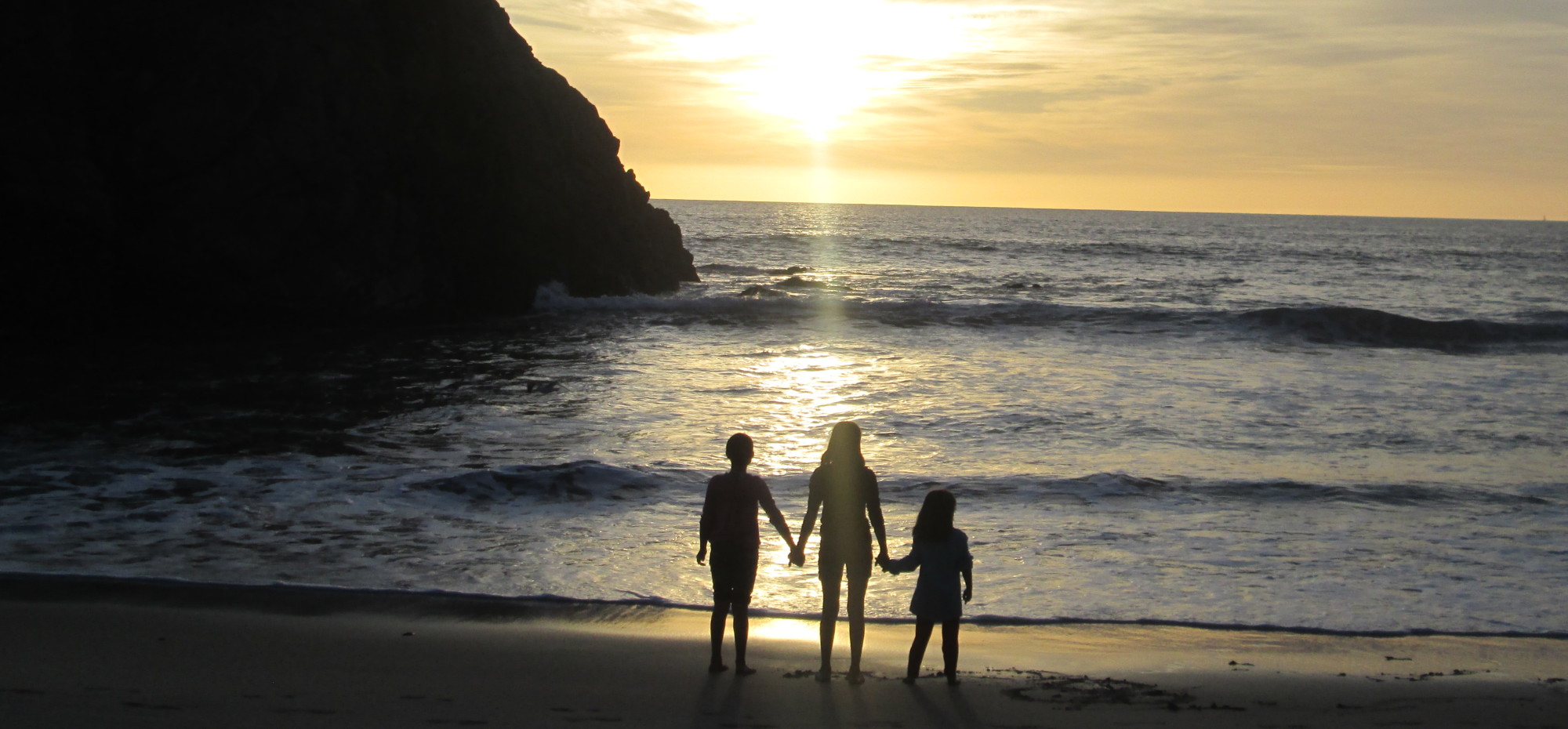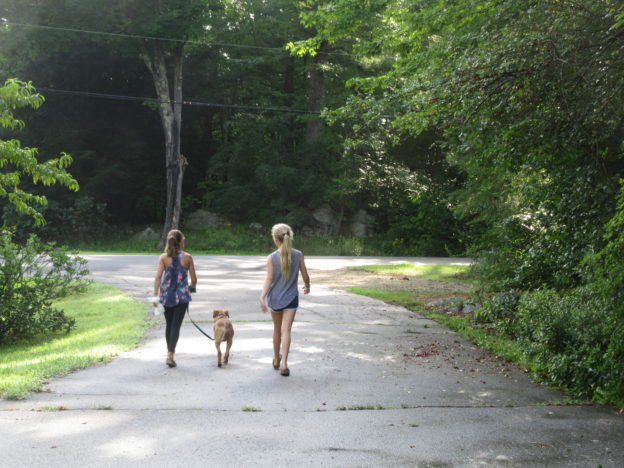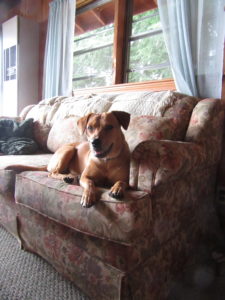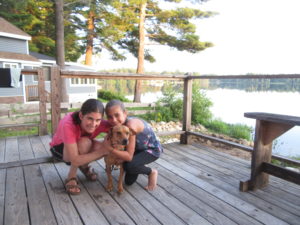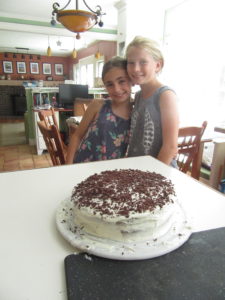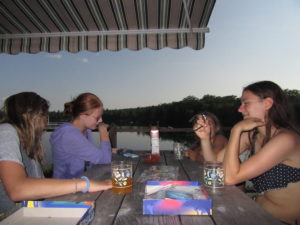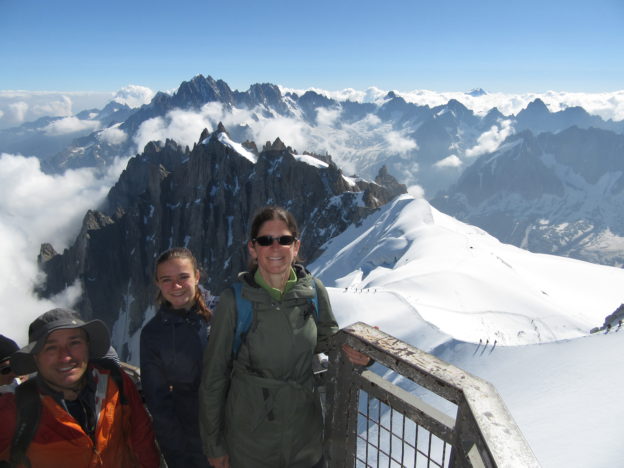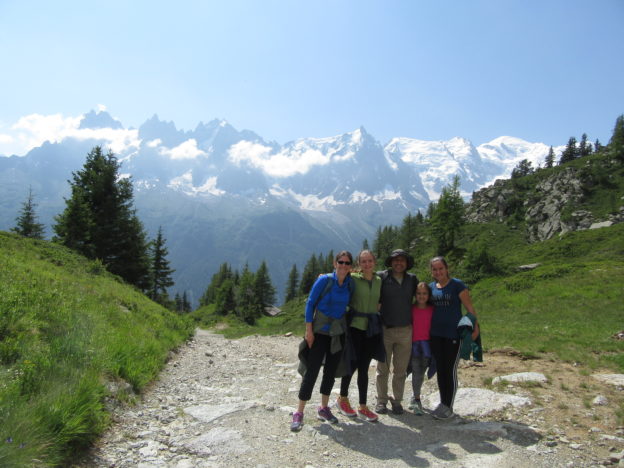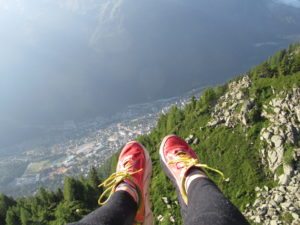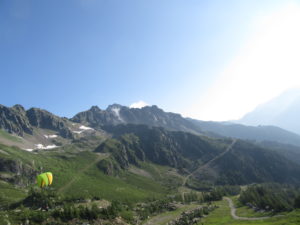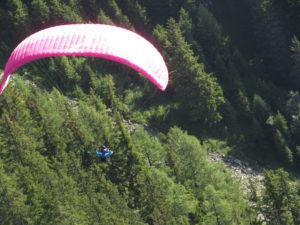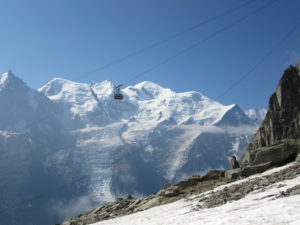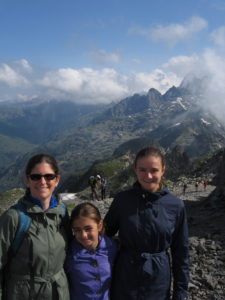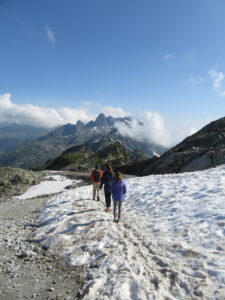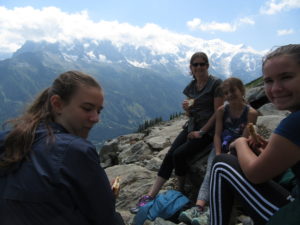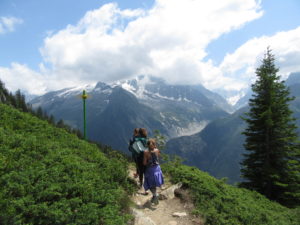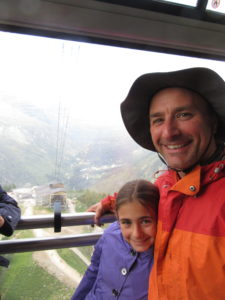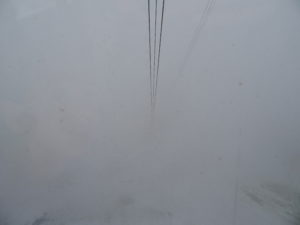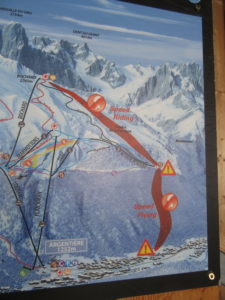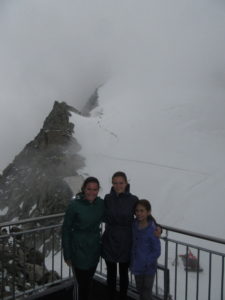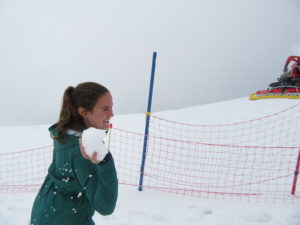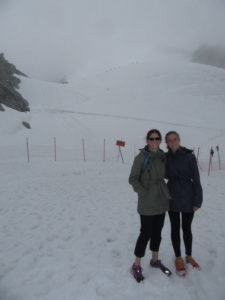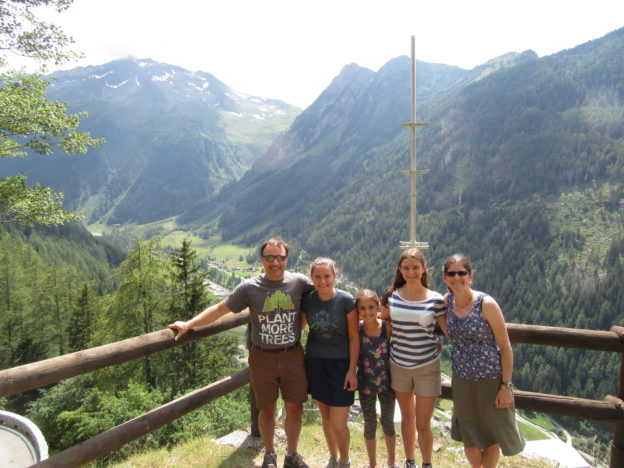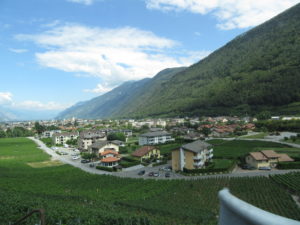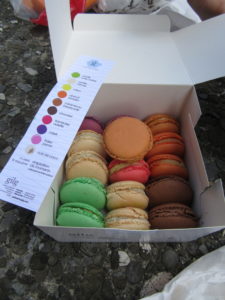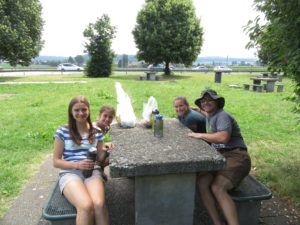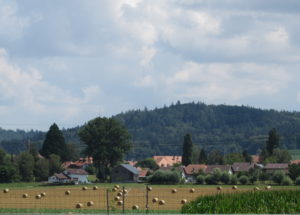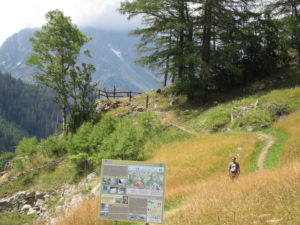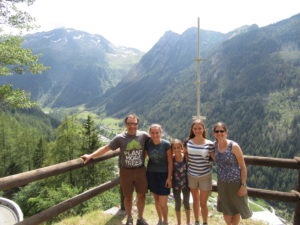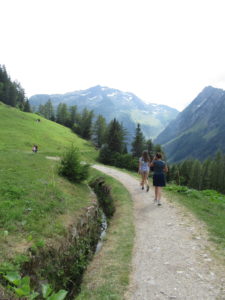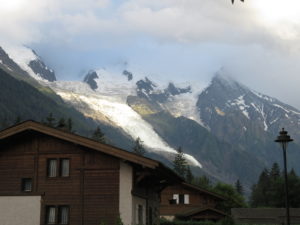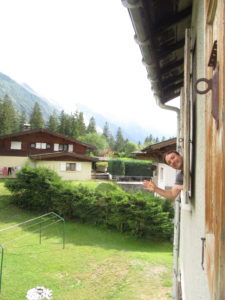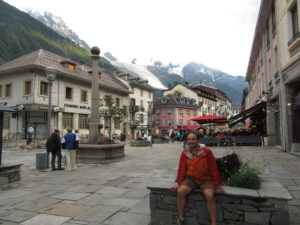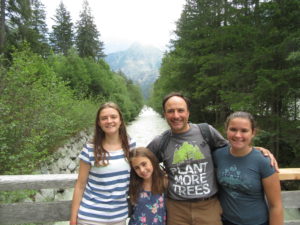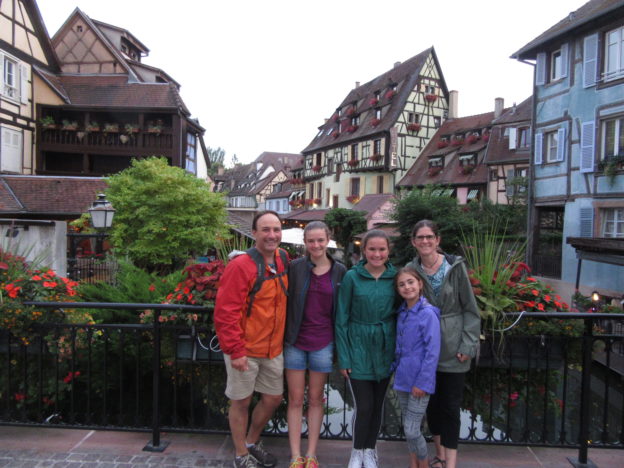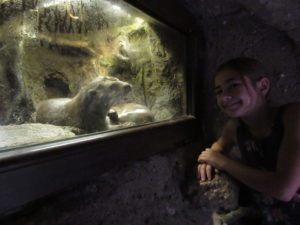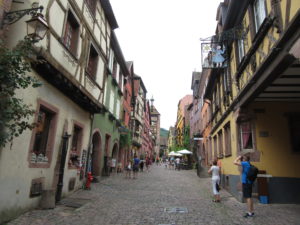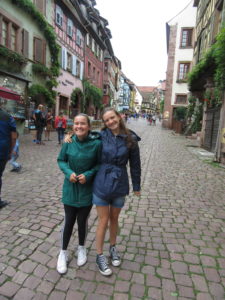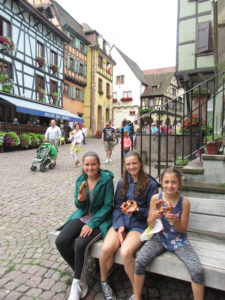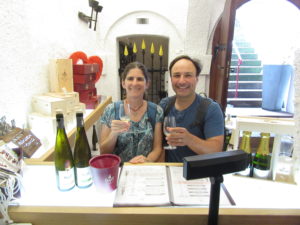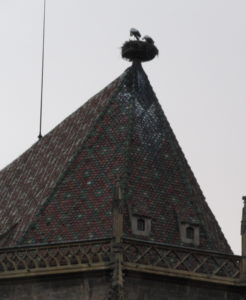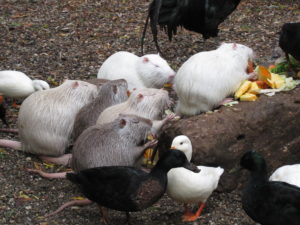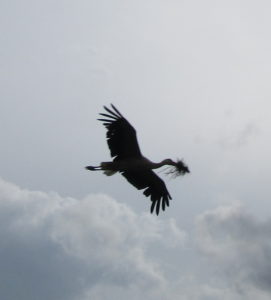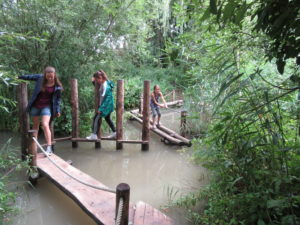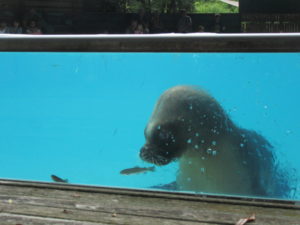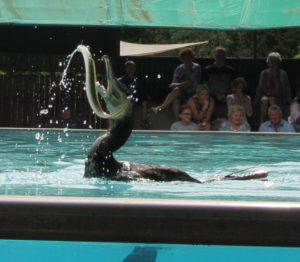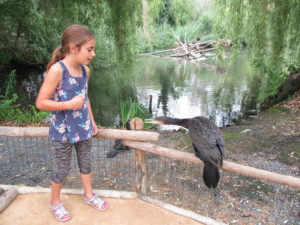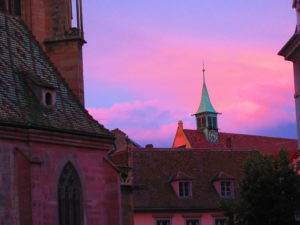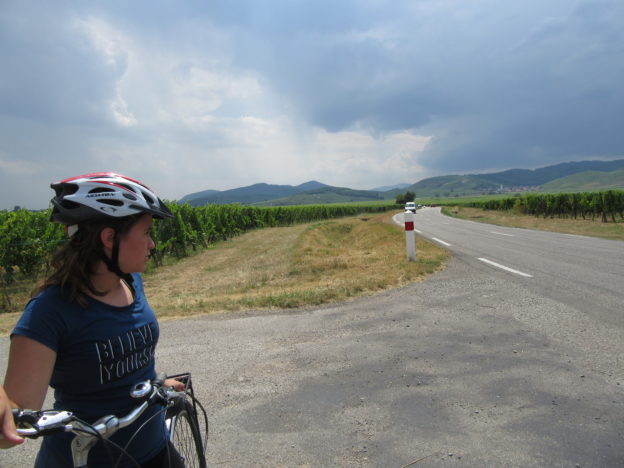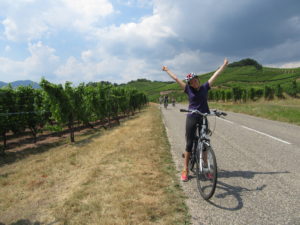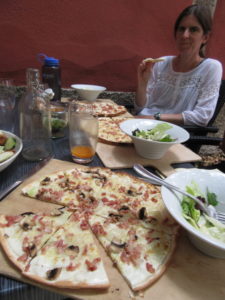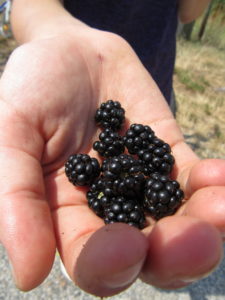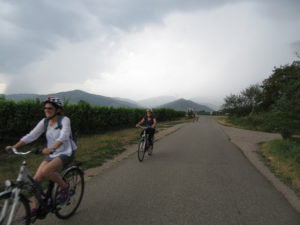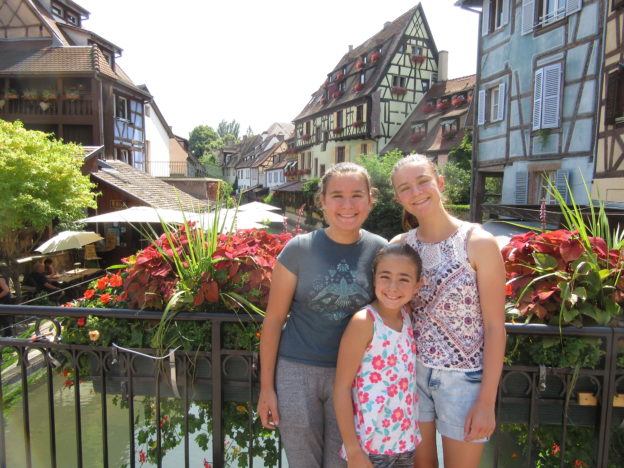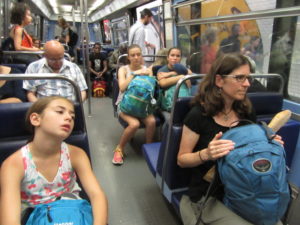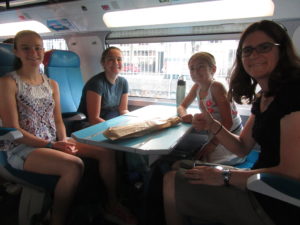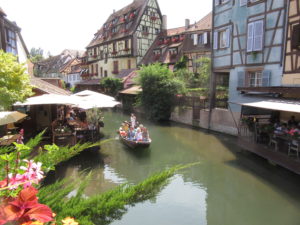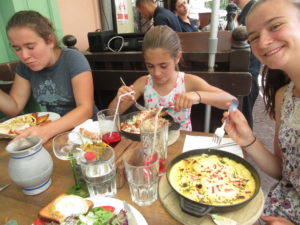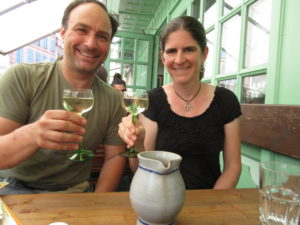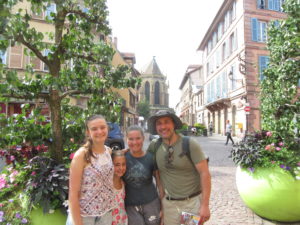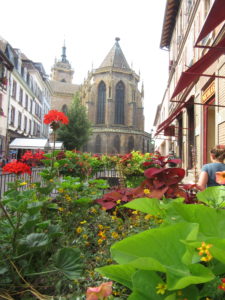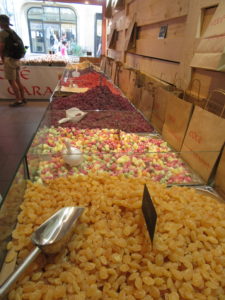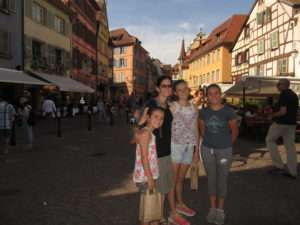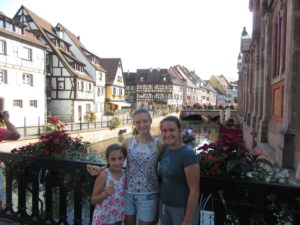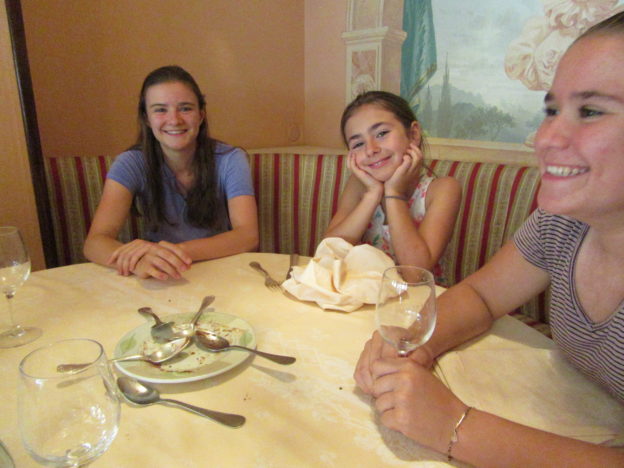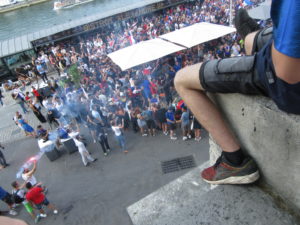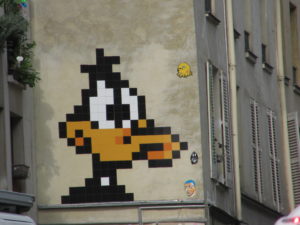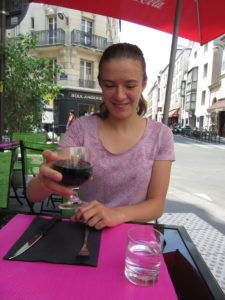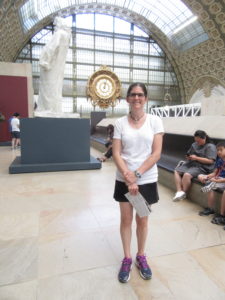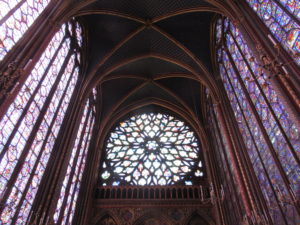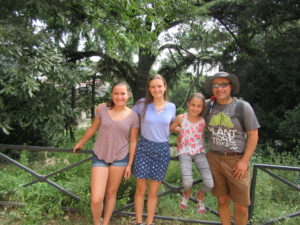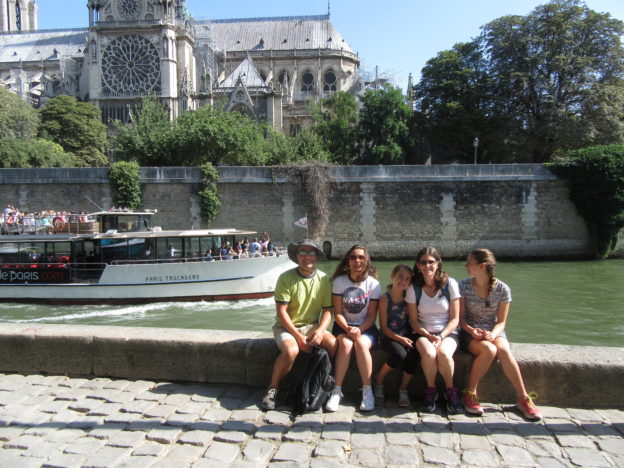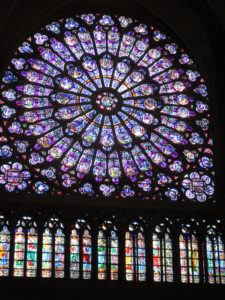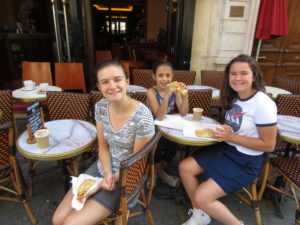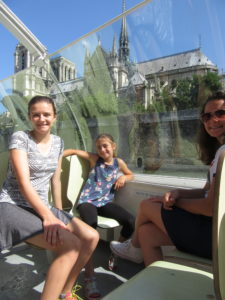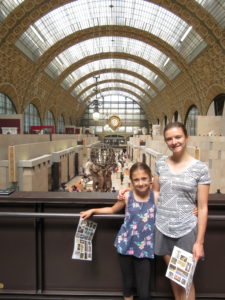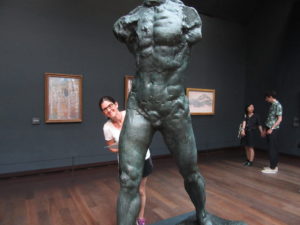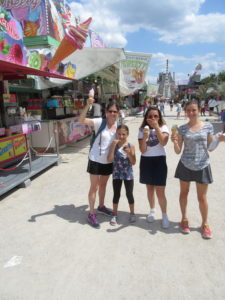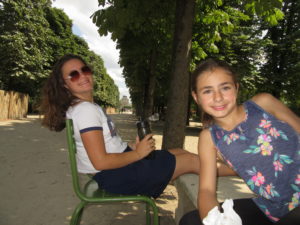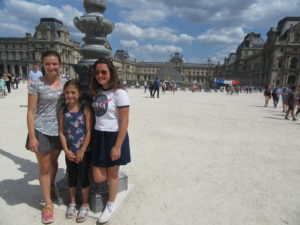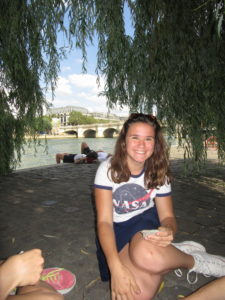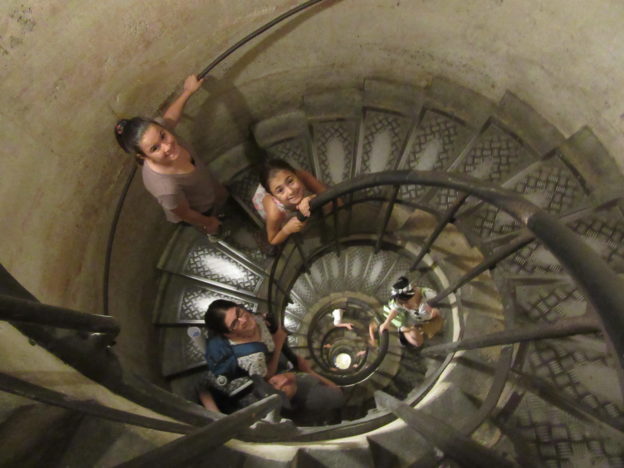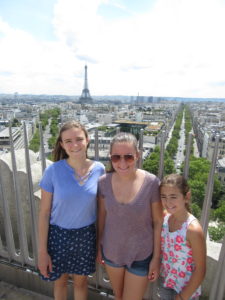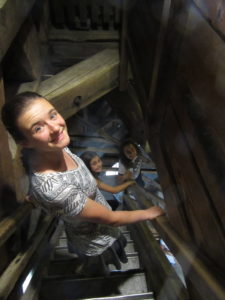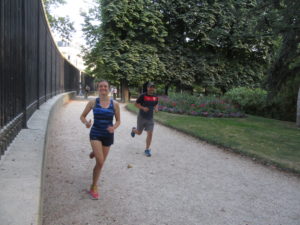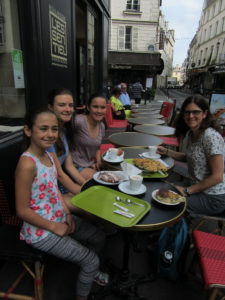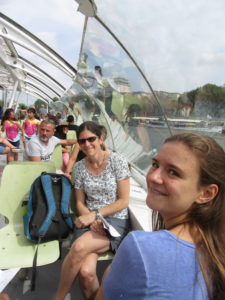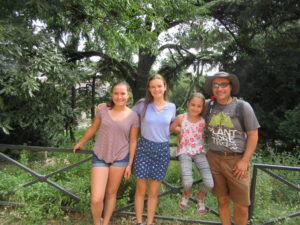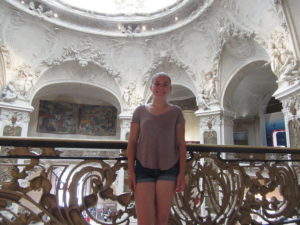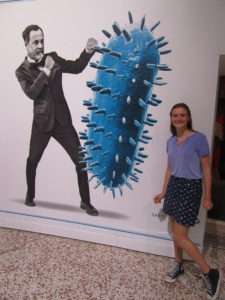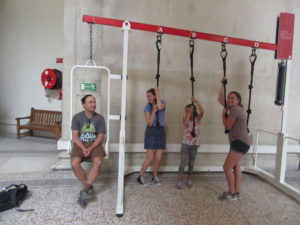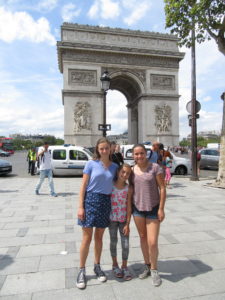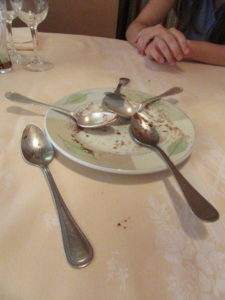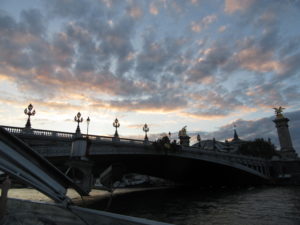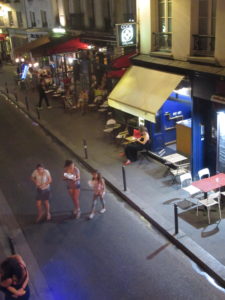Here we are, at the top of the alps –this part of the alps, at least
L’aiguille du midi is the A-1, gold star attraction here. It’s not the top of Mount Blanc, but it’s pretty close. And it’s as far up as you can get here without mountaineering gear.
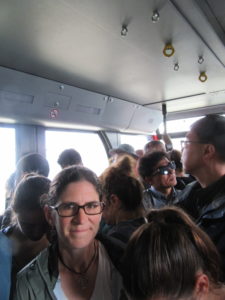 Unlike yesterday at Grands Monets, there are plenty of people in line for the gondola here. We have to get a reservation number, but the isn’t wasn’t long. It’s good that we arrive early, We got a little after 8 am.
Unlike yesterday at Grands Monets, there are plenty of people in line for the gondola here. We have to get a reservation number, but the isn’t wasn’t long. It’s good that we arrive early, We got a little after 8 am.
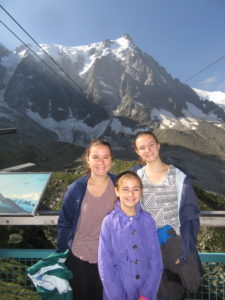
We’re going to the very tip of the peak behind the girls.
No waiting time at the midpoint. We go right into line for the cable car to the top — and what a cable car ride it is. The thick black cords arch upward along a sheer face of rock and snow, and the large cars shrink to almost invisibility — to those watching and waiting anxiously on the platform — as they make their trek to the top. By the end of the trip, the trajectory is almost completely vertical.
The ride takes exactly 180 seconds. I count as I look at the floor. Even Jen is a little uncomfortable with this trip. “Who even Thinks about putting a cable car here?” she asks.
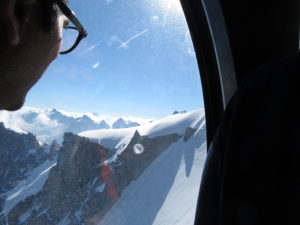
Mountaineers on the ridge
I actually look out the window as we get near the top, who knows why. Here, incredibly high off the valley floor, are more mountaineers navigating a tightrope ridge of snow.
In excruciatingly slow motion, the car ascends the final 20 feet and docks at the landing. We are as high as we could go..or are we?
The station at the top promises us 360-degree views. It also features several viewing decks at various levels, many connected by grate (virtually see-through) stairways. There’s a bridge — thankfully solid and opaque — over a 200-meter precipice, and just when we think we’ve seen it all, we notice there was an elevator that would bring us up to another platform, 100 meters higher than the cable car landing.
Oh, and then there ae the views (if you can, click on the pictures to enlarge them):
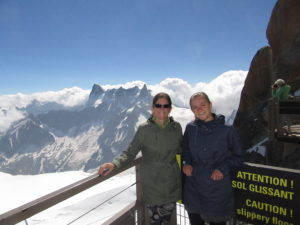
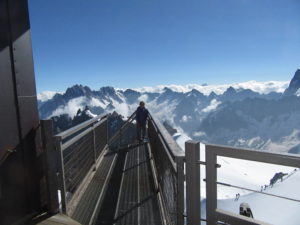
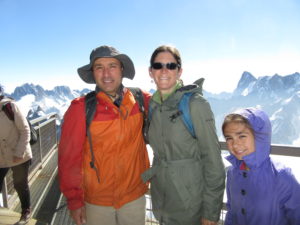
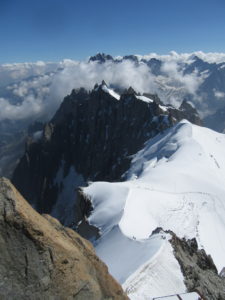
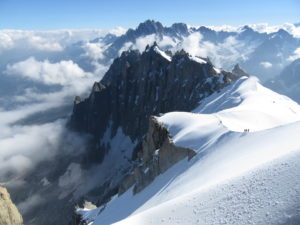
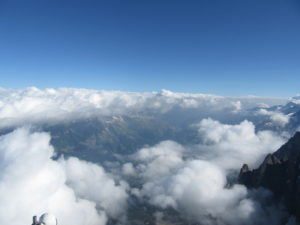
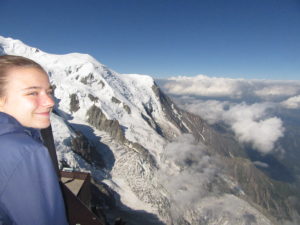
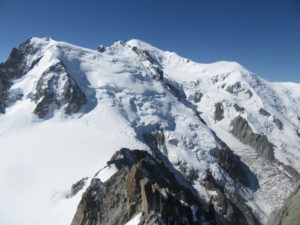
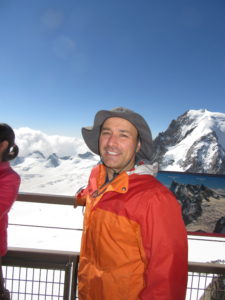
At the top, 12,602 ft
Three of us make it up to the top (though I only stay there long enough to prove I was there and to peek very meekly over the railing at Chamonix far below — it is like looking out the window of a cruising airplane). The others stay in the gift shop and cafeteria. The air is thin here and it’s understandable to want to rest.
I actually get a burst of energy, though. I wander around the station. There’s a tunnel through the rock, a big metal tube with small windows that made you feel like you were looking out of a space station onto a frozen exo-planet, a small museum on mountaineering, an exhibit that teaches about the dangers of hypoxia, and several viewing platforms.
It is crowded here, and most people want to get closer to the edge than I do, but my exploring pays off. I take Lanie for a tour while we wait for Zoe and Jen to come back down in the elevator. They’re in a very long line at the top waiting for Zoe to “step into the void,” which is to say she wants to stand in a glass closet affixed to the side of the station. It allows for great views horizontally across 180 degrees. and terrifying views straight down into a kilometer-deep precipice. Literally there is no ground beneath you for 1,000 meters.
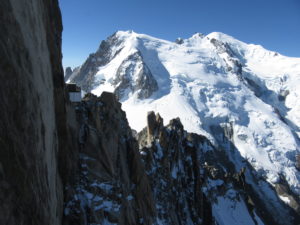
Rock climbers join in the fun
Zoe is excited about this because she is Zoe. Jen and I think it’s kind of cool because it costs 30 Euro, but it is included in our multi-pass.
Sadly, the wait proves to be too long. They exit the elevator without the any Pavliks stepping into the void, and I am able to give those guys a tour of the facility. By now I can show them extra things that Lanie and I found, like the ice cave that we can walk through. There is also an icy portal onto the mountain that you need to be wearing cold-weather gear, foot spikes and a rope attaching you to several other people before you can go through it.
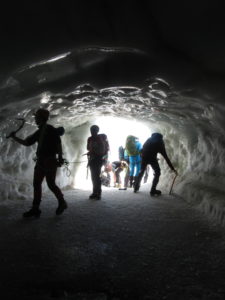 Signs near the portal warn skiers of the dangers of these high-altitude snow fields. You must be a red-level skier (which we think equates to expert, black-diamond level here) and have a professional guide to ski here. Nobody is trying it today. It must be more of a winter activity when you can ski all the way to the bottom (maybe 11,00 feet of vertical drop — amazing).
Signs near the portal warn skiers of the dangers of these high-altitude snow fields. You must be a red-level skier (which we think equates to expert, black-diamond level here) and have a professional guide to ski here. Nobody is trying it today. It must be more of a winter activity when you can ski all the way to the bottom (maybe 11,00 feet of vertical drop — amazing).
We also pass the landing for gondolas that ferry people from the l’Aiguille du Midi about 50 minutes across mountaintops and glaciers to the Hellebroner peak on the France/Italy border. From there one can descend into Italy. Cool way to travel, in theory at least. These gondolas are closed down while workers repair storm damage. Not a big deal to us — it wasn’t included in the multi-pass.
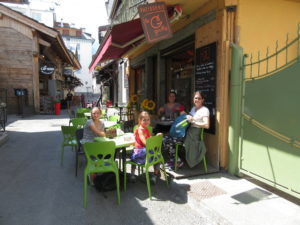
Hot chocolate with a side of oxygen
That completes our tour of the top. I count up to 180-one thousand on the way back down the cable car, and once again it’s like we’re back on Earth. Farther down we go into Chamonix to a cafe that promises more than a dozen kinds of hot chocolate. That sounds fine when you’re up in the snow fields and the temperature is near freezing, but back in the valley, it’s about 80 degrees. Two people still get hot chocolates out of guilt because we walked all over the place in 80-degree heat to find this particular cafe. On the plus side, there seems to be plenty of oxygen down here.
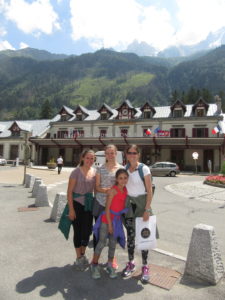 Just when you think we’re done adventuring, remember that we’ve still got the multi-pass. Plus, the cafe is not far from the train station. Here we pick up seats on a cog railway that takes us on a leisurely run up the north side of the valley to another glacier, the Mer du Glace.
Just when you think we’re done adventuring, remember that we’ve still got the multi-pass. Plus, the cafe is not far from the train station. Here we pick up seats on a cog railway that takes us on a leisurely run up the north side of the valley to another glacier, the Mer du Glace.
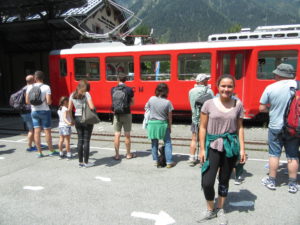 We are not entirely prepared for this trip, partly because Jen has told us we are quit of hanging from cables, yet there is another gondola here on the side of the glacier, to take us down to the ice. It is not mentioned in the guide book. We all decide that one more gondola ride beats walking down and up a hill, so on we climb.
We are not entirely prepared for this trip, partly because Jen has told us we are quit of hanging from cables, yet there is another gondola here on the side of the glacier, to take us down to the ice. It is not mentioned in the guide book. We all decide that one more gondola ride beats walking down and up a hill, so on we climb.
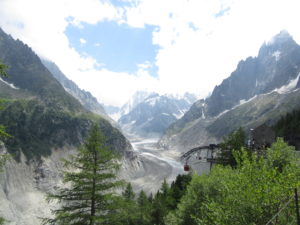
Wait, another gondola?
This gondola is not particularly scary in terms of altitude, but it is part of a very depressing descent. It was built 50 years or so ago to take people down to the glacier; but when you get out of the car. the glacier is still several hundred feet below you.
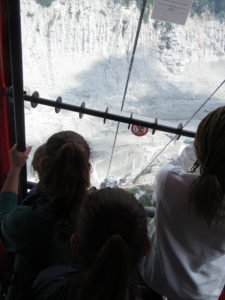 As you descend the dozens of flights of stairs to get down to the ice, you realize that it wasn’t meanness or an engineering miscalculation that deposits people from the gondolas so high in the valley. Signs along the trail indicate the height of the ice in past years. Even since 1985, the first sign posted on the trail, it has descended steadily, melting away into the river that runs cold and strong through Chamonix even in the middle of summer.
As you descend the dozens of flights of stairs to get down to the ice, you realize that it wasn’t meanness or an engineering miscalculation that deposits people from the gondolas so high in the valley. Signs along the trail indicate the height of the ice in past years. Even since 1985, the first sign posted on the trail, it has descended steadily, melting away into the river that runs cold and strong through Chamonix even in the middle of summer.
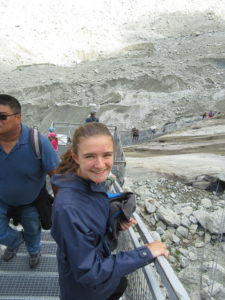 Indeed, the Mer du Glace (or “Sea of Ice”) glacier used to reach up to the solid, three-story stone building where the train terminates and the gondolas start. There is a photograph of this from the late 1800s, when they measured the glacier to be 270 meters deep. We learn when we finally got down to ice level that there is perhaps 90 meters of ice left.
Indeed, the Mer du Glace (or “Sea of Ice”) glacier used to reach up to the solid, three-story stone building where the train terminates and the gondolas start. There is a photograph of this from the late 1800s, when they measured the glacier to be 270 meters deep. We learn when we finally got down to ice level that there is perhaps 90 meters of ice left.
Depressing.
But they’ve continued adding flights of stairs down so tourists can get to the ice cavern. This is a very interesting experience. Yesterday we walked on top of a glacier, today we get to walk inside one.
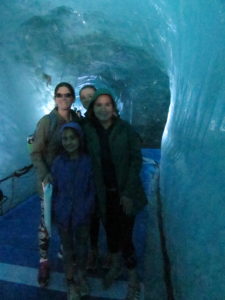
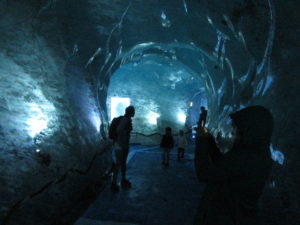
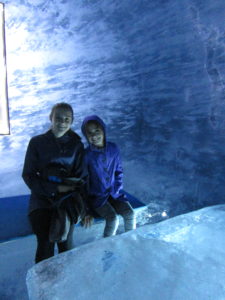
Although the disappearing glacier is a bit of a downer to end our time in the alps, it is also a sobering reminder that we need to do as much as we can to help stop the warming of the planet. The views are some of the most dramatic of the trip, as well.
All that is left is to give the kids their fondue fix — they make their own simmering beef-broth bath in the electric fondue pot conveniently stocked by our apartment’s owner. The parents slip out to eat in the main square downtown.
Then it’s time for packing. We will have little time tomorrow to get ready to leave. Our flight leaves at 12:30 from Paris. We have a six-hour drive to get there. We’ll need to be on the road by 4 am.
Au revoir, Chamonix. Au revoir. France.
